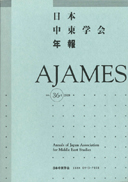Volume 36, Issue 1
Displaying 1-9 of 9 articles from this issue
- |<
- <
- 1
- >
- >|
-
Article type: Article
2020Volume 36Issue 1 Pages 1-27
Published: August 31, 2020
Released on J-STAGE: September 30, 2021
Download PDF (1041K) -
Article type: Article
2020Volume 36Issue 1 Pages 29-61
Published: August 31, 2020
Released on J-STAGE: September 30, 2021
Download PDF (514K) -
Article type: Special Feature
2020Volume 36Issue 1 Pages 63-66
Published: August 31, 2020
Released on J-STAGE: September 30, 2021
Download PDF (42K) -
Article type: Special Feature (Article)
2020Volume 36Issue 1 Pages 67-99
Published: August 31, 2020
Released on J-STAGE: September 30, 2021
Download PDF (333K) -
Article type: Special Feature (Research Note)
2020Volume 36Issue 1 Pages 101-124
Published: August 31, 2020
Released on J-STAGE: September 30, 2021
Download PDF (205K) -
Article type: Special Feature (Research Note)
2020Volume 36Issue 1 Pages 125-154
Published: August 31, 2020
Released on J-STAGE: September 30, 2021
Download PDF (238K) -
Article type: Special Feature (Research Note)
2020Volume 36Issue 1 Pages 155-173
Published: August 31, 2020
Released on J-STAGE: September 30, 2021
Download PDF (199K) -
Article type: Special Feature (Research Note)
2020Volume 36Issue 1 Pages 175-200
Published: August 31, 2020
Released on J-STAGE: September 30, 2021
Download PDF (573K) -
Article type: Book Review
2020Volume 36Issue 1 Pages 201-204
Published: August 31, 2020
Released on J-STAGE: September 30, 2021
Download PDF (89K)
- |<
- <
- 1
- >
- >|
